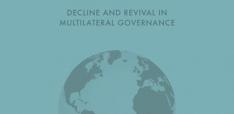Cameron and the Referendum
Karl Muth explores how the form and manner of the UK’s integration with Europe is increasingly coming to define David Cameron’s career.
In the wake of UKIP successes in the recent elections, the Cameron government has been forced (by factions further right), in a rare concession, to offer a referendum. The so-called departure referendum (which will no doubt have a series of ever-more-confusing nomenclatures attached to it, like most wintertime Tory political initiatives) will be a vote for the United Kingdom to leave the European Union, to be ratified (or not) by the voters of an increasingly-fractured United Kingdom, split among conflicting ideologies and lineages of rhetoric.
The referendum puts Cameron in a difficult position, however. He is being asked by those to his right to engage in the very advocacy he dismissed and even mocked when it was put forth by the Scots only months ago. I argue he cannot, with anything but the soggiest legitimacy, make these arguments in the UK-EU context when his reaction to Scotland’s independence rhetoric was so severe. Instead, he must support the referendum procedurally, rather than in its conclusion, and must focus his attention on the means rather than the end – despite a voice on his shoulder pressing for the opposite.
I suspect voters will find Cameron’s pandering to an ever-more-conservative base of support not only patronising to those outside the M25 but insulting to those who were the financiers, allies, and evangelists of his candidacy in the Capital. The mixture of xenophobia and budget myopia that has come to characterise the new Conservatives must shift Cameron slightly rightward, and in so doing he will be asked to entertain – or even advocate – the same arguments for independence from Europe that the Sunday Herald made in Glasgow.
This predicament is made even more difficult in the context of our nation’s fragile relationship with the Continent, not only in trade but also in defence and taxation policy and other areas. In the matter of trade and macroeconomic policy alignment, our current prosperity is inexorably intertwined with a Labour government – without Straw’s political manoeuvring, the currency arrangement would have been lost and with it the Bank of England’s functional sovereignty.
This puts Cameron in the untenable position of exploring a decidedly conservative set of reasons for departure from the European Union as a way of cementing a set of economic victories won by liberals during an era when Cameron was still struggling to make it onto the national stage from Witney campaign offices behind his college (the gust in his political sails soon thereafter coming in his being named replacement for Tim Collins as Shadow Secretary).
Cameron has been forceful and vociferous in his support for a financially-independent United Kingdom and has spoken of the importance of London as not only the financial capital of the UK but also as the financial hub of Europe. This should continue to be his focus and is no doubt correct. It would be foolish to view financial services in the UK as anything other than a critical industry to GDP, employment, and everything between. But Cameron’s recent rhetoric surrounding taxes-dodging and T1 millionaires has the potential to alienate those who fund both his colleagues’ dinners and his nation’s banks. He must exhibit caution, and conspicuously.
To navigate the mines laid in recent years, Cameron must quickly divest himself of the philosophical baggage right-wingers have asked him to unpack. He must state clearly that there are robust reasons – economic reasons – for a referendum vote that are not rooted in hatred of foreigners, paranoia about Continental political conspiracies, or fear of convoluted banking rules not yet proposed. These basic economic reasons, fundamental to decisions that must be made about the UK’s future, are sufficient to make a referendum a reasonable, if not necessary, political process.
To the extent that Cameron can stay agnostic as to the actual matter of independence, leaving the choice in the hands of voters, it will be to his benefit. The integrity of his performance and office will be put in jeopardy if he is seen as having a thumb on this particular scale, and there is no way to win as a participant in this game with Tories to both his left and right ready to pounce. While hard-line Tories may want his support for a particular platform or may want guarantees based upon what-if’s, the Scotland escapade teaches that such glimpses over the horizon are premature, ill-advised, and confusing to those abroad (including politicians and investors). He must be little more than an observer and narrator in any referendum vote, like Attenborough describing the pursuit of a zebra.
In the end, holding a referendum that empowers voters – if done with the greatest care and not in terms beyond those – may allow Cameron to escape both the legacies and the blame of the furthest-right. He may even be able to claim an additional measure of credit for the economic recovery (something the Tories have struggled to do with any credibility), thereby bolstering the weight of his opinions on these matters and possibly even increasing the acceptance of Conservative budget initiatives in 2015. This would please those at the base of the party’s support, as the recently-tendered budget is a stopgap measure on all sides, a briefcase full of answers that pleased no one.
However, if it should go poorly, it could well be the careers of his entourage on the line. It would be all too easy for Cameron’s cadre of Oxbridge safe-county intelligentsia to seem to be drifting too far right, to be advocating an overly flag-waving jingoistic platform, or to be interfering with the very recovery they hope to be seen as leaders – and not mere administrators – of. The near-right and far-right will have an inevitable, messy divorce, but Cameron must resist the temptation to pour salt in these wounds in the context of the referendum discussion, or there will be no winners. We cannot feud with Europe and with each other simultaneously any more than we could in 1658.


